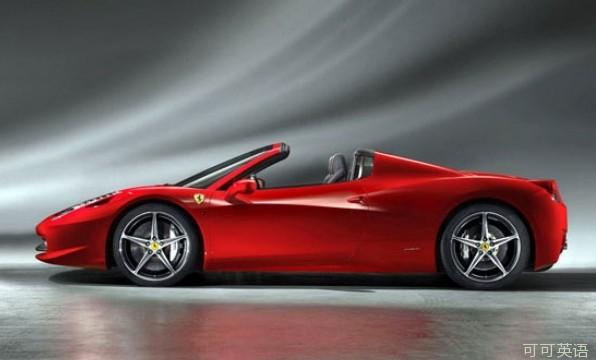
Business Frankfurt Motor Show Autoficial intelligence
商业 法兰克福车展 自动的智慧
Where does the car end and the phone begin?
哪里是手动的终结,自动的开始?
SHARON can park herself.
SHARON能自己停车。
At a signal from a smartphone, a system of tiny computers activates her engine, gearbox and steering—and she reverses smoothly into a parking space. Sensors stop her from bumping into other cars or people.
从智能手机发出信号,一个微型电脑的系统会启动她的引擎,变速器和转向系统——她便能安安稳稳地倒到停车位。
Pilotless cars, such as the Volkswagen Sharan (nicknamed Sharon), are no distant dream.
传感系统能阻止她撞到别的车或行人。像大众Sharan(绰号Sharon)这类无人驾驶汽车,已经不是遥不可及的梦。
Many people at this week's Frankfurt Motor Show were asking not only how the cars of the future will be powered, but who or what will drive them.
在这周的Frankfurt Motor展览会上,许多顾客并不仅仅询问未来汽车的动力如何,也开始关心由什么来操纵它们。
"Where does the car end and the phone begin?" asked Chris Anderson, the editor of Wired magazine, at a brain-storming session organised by Audi, a carmaker.
在一个由汽车制造商Audi组织的研讨会上,"哪里是人工的终结,智能的开始?"Wired杂志的主编Chris Anderson问道。
A future car will be more like a computer on wheels, networked with the surrounding infrastructure and other vehicles.
未来的汽车更像是一台带轮子的电脑,与周围的建筑物和车辆联网。
Even if it comes with a steering wheel, the "driver" will have the Knight-Rider-esque option of being piloted while he video-conferences, answers e-mails or looks on a screen at an annotated view of the world whizzing by.
就算有方向盘,汽车在呼啸而过的同时,"驾驶者"可以启动守护骑士这一选项来导航,从而方便驾驶者视频会议,回复邮件或者以透视的视角来看地图。
The threat to the taxi drivers parked outside the show is obvious.
但是对停在Frankfurt展览会外面等活的出租车司机们来说,这是不靠谱的。
But Frankfurt's cabbies are a sceptical bunch.
未来汽车对他们的威胁是显而易见的。
Driverless taxis? Not in my lifetime, says one.
无人驾驶的出租?我这辈子是看不到了,一个司机师傅说到。
"It's science fiction," scoffs another.
"科幻小说吧,"另一个讽刺道。
In tough times, many carmakers are innovating like fury.
在汽车行业不景气的时候,不少汽车制造商都在疯狂地创新。
Some are recasting themselves as "mobility service providers".
一些厂商把自己打造为"移动服务供应商"。
This means hawking car-related software and other add-ons.
这意味着以汽车相关软件和附加装置为卖点。
For example, for those who prefer to hire or share cars—as young city-slickers increasingly do—there is software to make them feel at home in any vehicle, by instantly switching the radio and other settings to their tastes.
举个例子,随着爱赶时髦的年轻人越来越愿意以租车或者合用方式驾车——因为可以通过迅速地调换电台和其他的设置满足自己的口味,应用软件能让他们在任何车辆里随心所欲。
Some carmakers are also tempting buyers with more mundane services, such as priority parking or cheap deals on fuel (whether petrol, hydrogen or electricity).
一些汽车制造商也用更多的普通服务来吸引买家,比如提供优先停车位和便宜的燃料方案(不管是汽油,氢还是电力)。
Or, to help them let off steam, they might offer an annual spin with that gas-guzzling sports-utility vehicle of their dreams.
要么,为了给顾客缓解压力,厂商每年举办短途游,车型都是买家梦寐以求的大排量SUV。
Even in changing times, there is still plenty of passion for a flash motor.
即使在人们观念在发生变化的今天,人们依旧对名车抱有极大热情。
Hence the covetous sighs that greeted the new Ferrari 458 Spider (pictured), which was unveiled on September 13th.
于是在9月13日,伴随着人们的渴望和欢呼声,人们迎来了新款法拉利458Spider(如图所示)。
Alongside it was Ferrari's first four-wheel drive four-seater.
同时这也是法拉利首款四轮驱动的四座跑车。
"Different Ferraris for different Ferraristi!" exclaimed Luca di Montezemolo, Ferrari's boss.
"与众不同的法拉利给与与众不同的法拉利人"法拉利的总裁Luca di Montezemolo宣称。
Even Volkswagen's new single-seater electric commuter, with its narrow body and wide wheelbase, looks rather like a 1950s racing-car.
就连大众的新款单座通勤概念车,窄窄的车身和宽宽的轴距,怎么看怎么像19世纪50年代的赛车。












